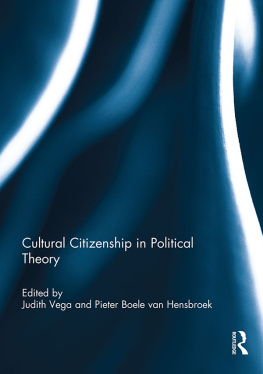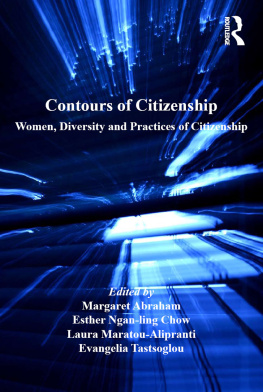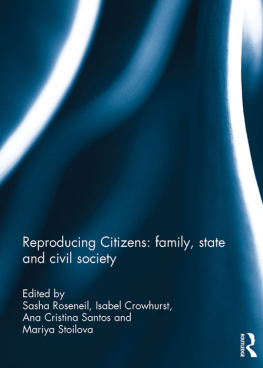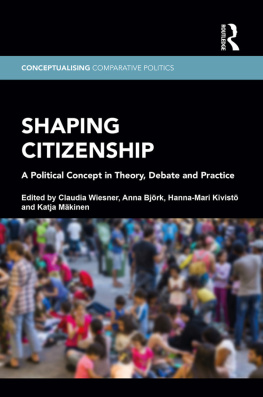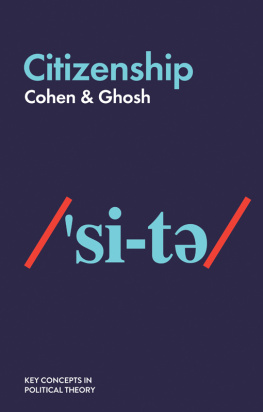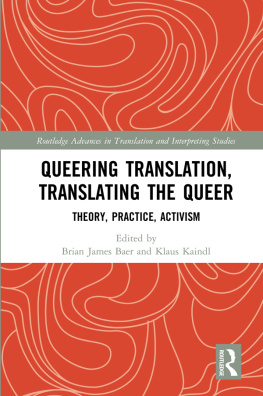Crossing borders and queering citizenship

Contemporary American and Canadian Writers
Series Editors
Nahem Yousaf and Sharon Monteith
Also available
The quiet contemporary American novelRachel Sykes
Sara Paretsky: Detective fiction as trauma literature Cynthia S. Hamilton
Making home: Orphanhood, kinship, and cultural memory in contemporary American novelsMaria Holmgren Troy, Elizabeth Kella, Helena Wahlstrom
Thomas PynchonSimon Malpas and Andrew Taylor
Jonathan LethemJames Peacock
Mark Z DanielewskiEdited by Joe Bray and Alison Gibbons
Louise ErdrichDavid Stirrup
Passing into the present: contemporary American fiction of racial and gender passingSinad Moynihan
Paul AusterMark Brown
Douglas CouplandAndrew Tate
Philip RothDavid Brauner
Crossing borders and queering citizenship
Civic reading practice in contemporary American and Canadian writing
Zalfa Feghali
Manchester University Press
Copyright Zalfa Feghali 2019
The right of Zalfa Feghali to be identified as the author of this work has been asserted by her in accordance with the Copyright, Designs and Patents Act 1988.
Published by Manchester University Press
Altrincham Street, Manchester M1 7JA
www.manchesteruniversitypress.co.uk
British Library Cataloguing-in-Publication Data
A catalogue record for this book is available from the British Library
ISBN 978 1 7849 9309 2 hardback
First published 2019
The publisher has no responsibility for the persistence or accuracy of URLs for any external or third-party internet websites referred to in this book, and does not guarantee that any content on such websites is, or will remain, accurate or appropriate.
Typeset by Newgen Publishing UK
For my grandparents,
Anna, who never learned to read, and Adamos, who always read to her
Contents
This innovative series reflects the breadth and diversity of writing over the last thirty years, and provides critical evaluations of established, emerging and critically neglected writers mixing the canonical with the unexpected. It explores notions of the contemporary and analyses current and developing modes of representation with a focus on individual writers and their work. The series seeks to reflect both the growing body of academic research in the field, and the increasing prevalence of contemporary American and Canadian fiction on programmes of study in institutions of higher education around the world. Central to the series is a concern that each book should argue a stimulating thesis, rather than provide an introductory survey, and that each contemporary writer will be examined across the trajectory of their literary production. A variety of critical tools and literary and interdisciplinary approaches are encouraged to illuminate the ways in which a particular writer contributes to, and helps readers rethink, the North American literary and cultural landscape in a global context.
Central to debates about the field of contemporary fiction is its role in interrogating ideas of national exceptionalism and transnationalism. This series matches the multivocality of contemporary writing with wide-ranging and detailed analysis. Contributors examine the drama of the nation from the perspectives of writers who are members of established and new immigrant groups, writers who consider themselves on the nations margins as well as those who chronicle middle America. National labels are the subject of vociferous debate and including American and Canadian writers in the same series is not to flatten the differences between them but to acknowledge that literary traditions and tensions are cross-cultural and that North American writers often explore and expose precisely these tensions. The series recognises that situating a writer in a cultural context involves a multiplicity of influences, social and geo-political, artistic and theoretical, and that contemporary fiction defies easy categorisation. For example, it examines writers who invigorate the genres in which they have made their mark alongside writers whose aesthetic goal is to subvert the idea of genre altogether. The challenge of defining the roles of writers and assessing their reception by reading communities is central to the aims of the series.
Overall, Contemporary American and Canadian Writers aims to begin to represent something of the diversity of contemporary writing and seeks to engage students and scholars in stimulating debates about the contemporary and about fiction.
Nahem Yousaf
Sharon Monteith
Overall, this book has taken the best part of a decade to write. For their patience, guidance, good faith, and support, series editors Sharon Monteith and Nahem Yousaf, the fantastic team at Manchester University Press, and the anonymous critical readers have my humble gratitude.
I have been fortunate to be a citizen of a wonderful community of scholars, mentors, colleagues, and friends who have patiently put up with me as this book has gone through its many stages of development: my thanks to Sharon Monteith (again), Susan Billingham, Stephanie Lewthwaite, Jennifer Andrews, Michael Bibler, Hannah Hawkins, Nick Witham, Lydia Plath, Stephen Hipkin, Jude Riley, George Lewis, David Stirrup, and other colleagues at Canterbury Christ Church University and the University of Leicester. In particular, Gillian Roberts, Corinne Fowler, Martin Halliwell, and Catherine Morley have offered tea, cake, beer, and, most of all, incredible support and feedback.
My deepest gratitude to Gregory Scofield, Erin Moure, Nightwood Editions, and House of Anansi Press, for their generosity.
My parents, Maria and Nazih, and my brothers, Joe and Michael, made this project possible. They have always understood that, for me, reading is the solution to almost every problem.
Finally, my love and thanks to Gavan Lennon. You are my best thing.
In Thomas Kings 1993 short story, Borders, readers follow an Indigenous woman and her son as they set off from their home on the reserve and attempt to cross the CanadaUS border that cuts across the 49th parallel. The US border guard does not allow them to cross into the United States because the mother declares their citizenship as Blackfoot and not Canadian or American. The pair attempt to return and are not allowed to cross into Canada for the same reason. Despite attempts by border guards on both sides to elicit an acceptable answer from them, the mother steadfastly refuses to offer the declaration that they come from any side of the border other than the Blackfoot side (Borders p. 135). As a result of what has been variously read as either the border guards ignorance or the mothers stubbornness, the mother and the storys narrator spend three nights between the two border checkpoints in no mans land the literal borderlands sleeping in their car until a media frenzy forces the US border guards to let the pair through on the basis of their Blackfoot citizenship.
Kings short story highlights the relationship between citizenship, the state, and national borders, and, in particular, emphasises the erosion of Indigenous rights and sovereignty as they play out at North American borders, as suggested by one reporter who earnestly (but ignorantly) asks the young narrator how it [feels] to be an Indian without a country (p. 142). The mothers refusal to acknowledge any side of the border undermines and ultimately rejects the idea that her citizenship can be bounded by either a figurative or literal modern nation state whose borders were drawn at the expense of Indigenous people in North America. The CanadaUS border, in fact, as it runs across the 49th parallel and is touted as the worlds longest It is ironic, then, that the other questions asked of the mother in Borders include whether she is carrying any firearms or tobacco (Borders p. 135).


